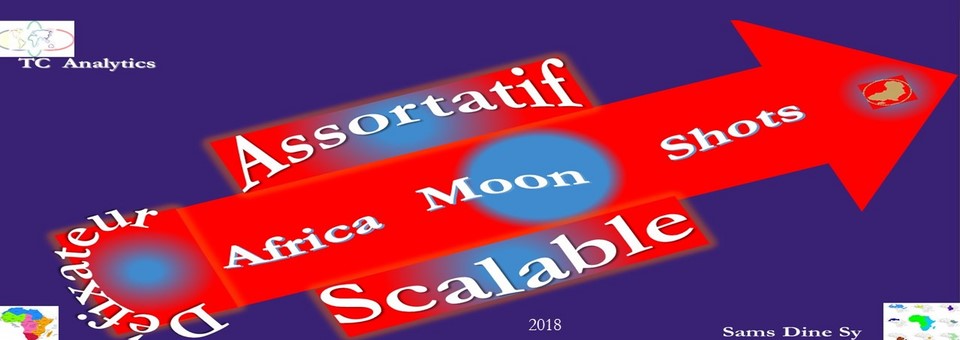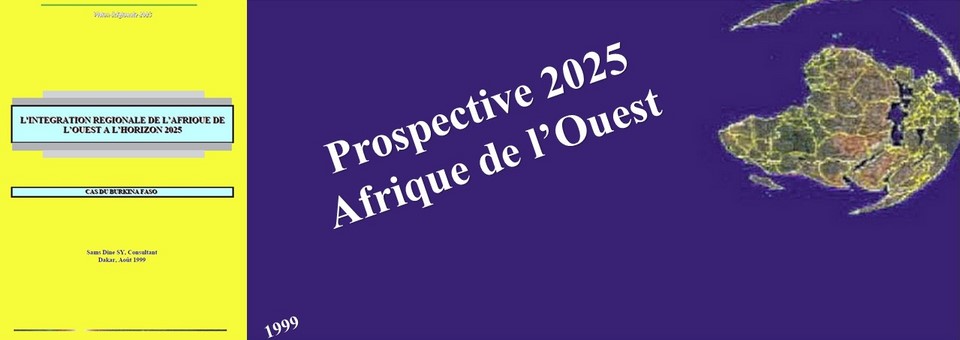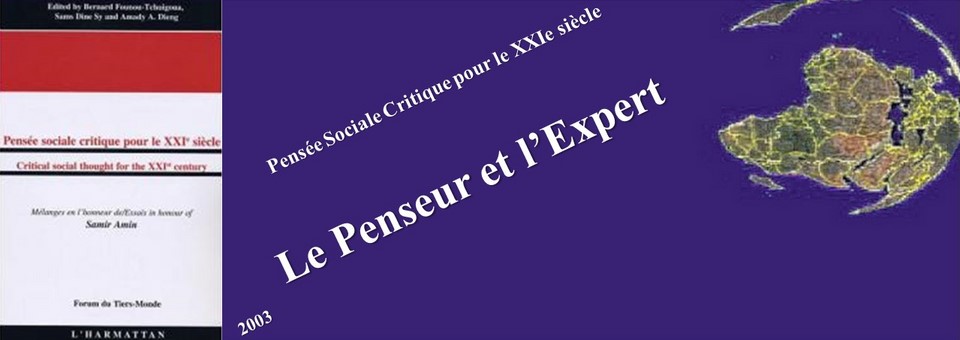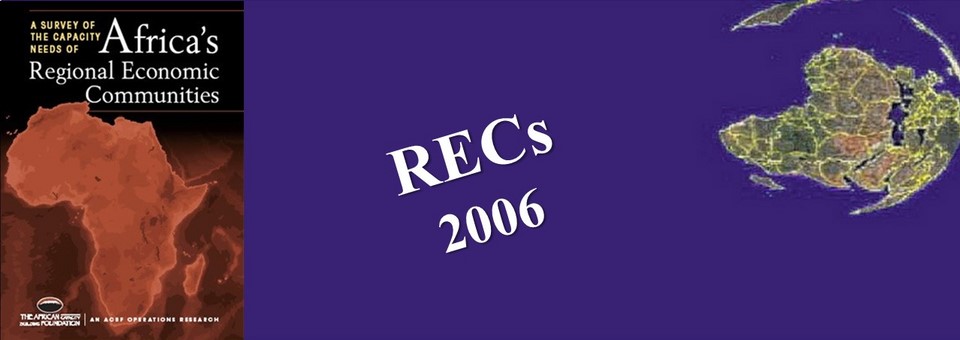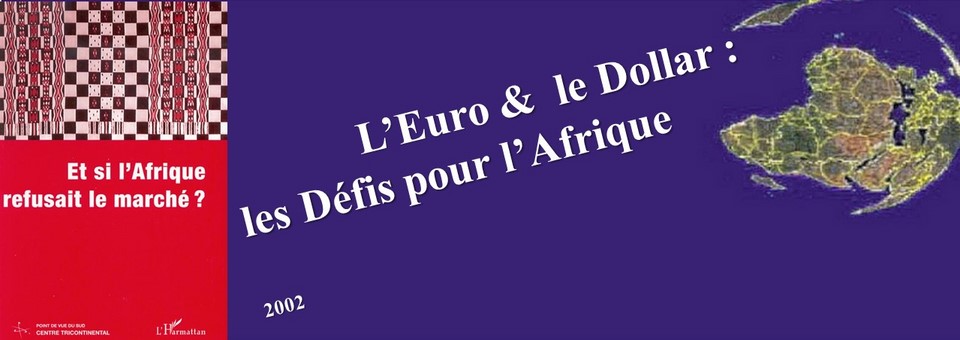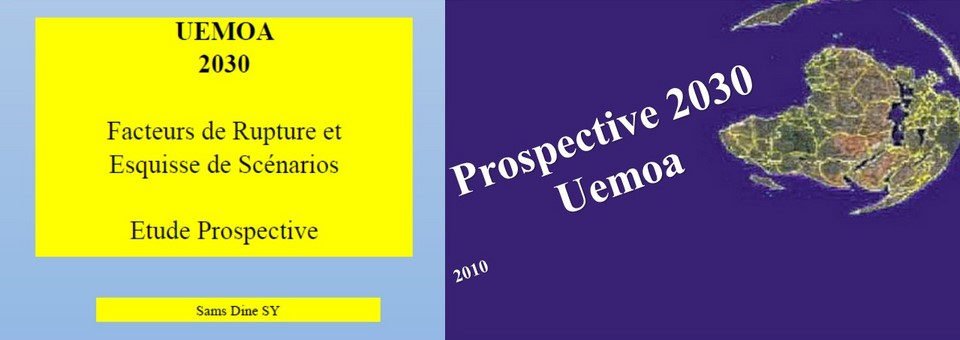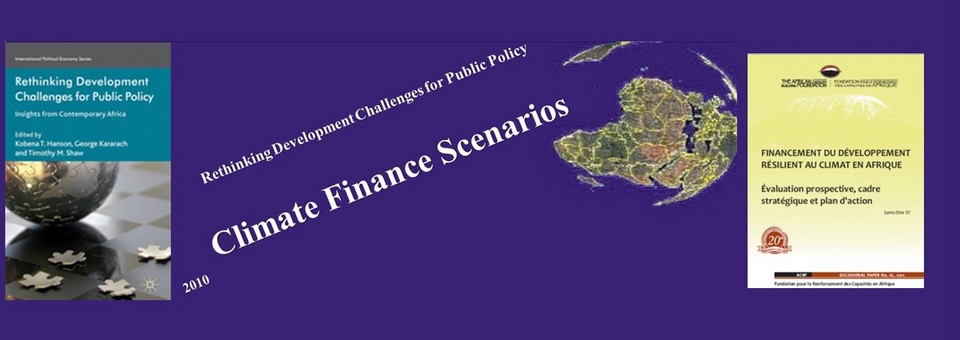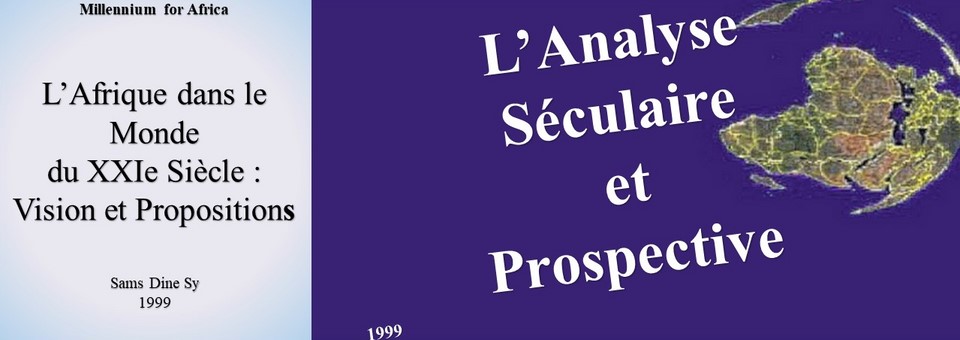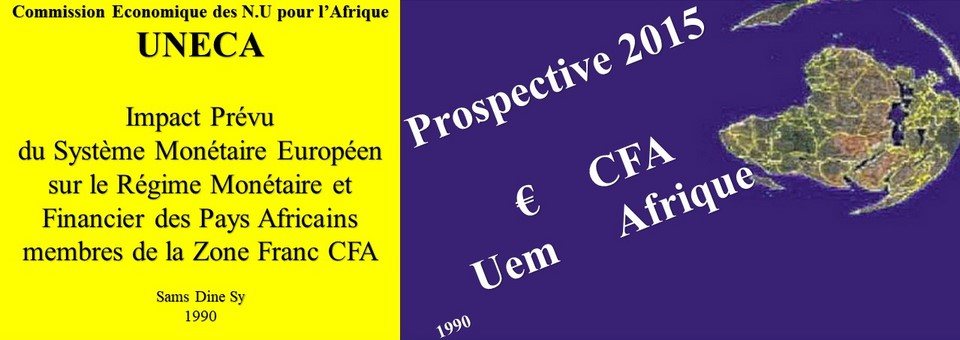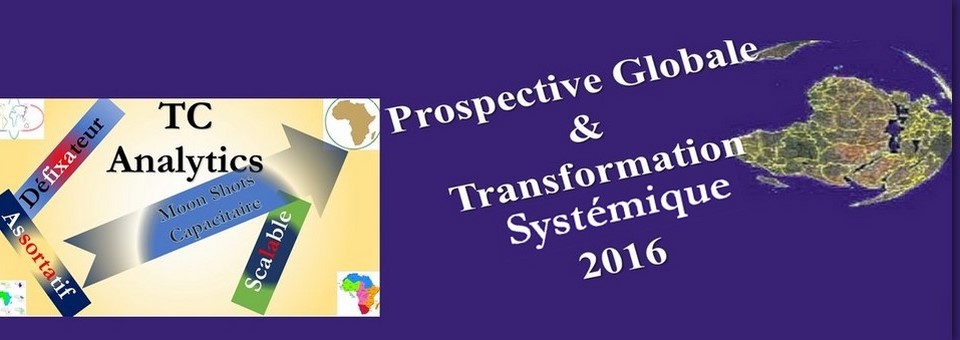2025, the favourite horizon of "Scenario Crafting & Story Telling" enthusiasts
..
2025 HORIZON PREFERE DES ADEPTES DU « SCENARIO CRAFTING & STORY TELLING »
2025, the favourite horizon of "Scenario Crafting & Story Telling" enthusiasts
Sams Dine SY*, 07/25/2024
Sams Dine SY*, 07/25/2024
At the beginning of the 21st century, 2025 remains the preferred horizon for those who are interested in "scenario crafting & story telling", especially those targeting the world and/or Africa. This is the case of the six exercises selected here, the most daring of which scrutinize at least a quarter of a century from a lower limit located in the second half of the 90s. The most complete ones include the entire world space, including Africa. The most cautious are exploring four scenarios. Others are content to plan a single trend or trajectory, even if it means enriching it with variants. Some have been put to the test in almost three decades by major wild cards and MIT shocks: from 11/09 to the current wars, including those covering all of West Asia, the subprime crisis, the multiple extreme events, terrorist acts, peasant revolts and Covid among others. The news just a stone's throw from this horizon is so rich in signals that it may be time to subject them to a final stress test. At the risk, of course, of completing most of them. This is because the common adage in the world of the arts is easily transposed to that of foresight: in wanting to paint (the future) one runs a risk, that of not being understood. Hence the importance of drawing lessons from these exercises, expanding the foresight methodology to better integrate it into the Distance Science and its Reproducible Spillovers Framework accessible to all when it is only a question of a world without a compass.
What does the Horizon 2025 foresight say?
A distinction should be made between exercises prepared before 2000 and covering the world and those designed during the first decade of the 2000s or limited to one continent. The greater the distance in time and space, the more the methodology of exploratory foresight imposes itself through "crafting" and "story telling". It is therefore not surprising that the majority of the exercises are part of the "scenario planning" or mega trend, which is more strategic, preventive or evaluative foresight, more suited to sectoral or firms issues.
Let us begin with a brief reminder of the exercises concerned, emphasizing the image of Africa conveyed by certain scenarios, before confronting it with reality and their limits. In order from the oldest, the year refers to the lower limit of the horizon and the initials to their author or patron:
1996 - US Department of Defense, DOD: "Air Force 2025" produced by US Air Force followed in 1998 by US Army: "Army after Next (2025)" all cited by J. Marguin (FRS 29/1/1999). This single scenario focuses on "2022: African Wars" and "2025: Number of UN Member Countries jumps to 297". The least that can be said at this stage is that wars mostly take place outside Africa. As for the UN, it is more concerned with its Pact 2.0 focused on young people and the future than with the search for new members.
1999 - Ministry of Regional Integration, MIR: "Burkina Faso and Regional Integration in 2025" written by S.D Sy. This exercise is the only one to be part of an exploratory foresight approach combining global scenarios and constructed narratives. He draws several of them, the fourth of which "Renewed Globalization - Africa Participates" evokes the creation of the current Community of Sahelian States (CSS) as an initiative that propels Inclusive Globalization from Africa through ECOWAS, its oldest Regional Economic Community, REC and the seven other African Building Blocks. "Story telling" triggers fascination and exasperation, accelerates the ratification of the African Union Treaty, provokes hatred and jealousy through the publication of books just to discredit them before appropriating their content and style. It also remains to be clarified the link of this exercise with the failure of the "African Wars" planned for 2022 in the previous US Air Force scenario. Regional integration from landlocked countries is now a unit of analysis that is all the more valued as the hypothesis of the regionalization of globalization integrates its inclusive form.
The two exercises that followed were less daring. One of them is limited to one continent. The other is written in the form of an article. The scenarios they present are content to repeat the ideas presented elsewhere:
2003: African Futures Project, NLTPS: "Africa 2025" Karthala. It is written in reaction to the previous one, as part of the activities of a project whose unit of analysis is the African state, with a view to including strategic foresight in its agenda with the sole aim of discrediting the 1999 exercise. The book presents four scenarios, two of which are tendential exclusively devoted to Africa reduced to the status of "lions". However, this attributive label neglects the heavy scope of the adage "Hic sunt leones" popularized by G. Berger (Phenomenology of Time and Prospective; Puf; 1964) when he compares Africa to the future, and whose fear has not ceased to condition since ancient times, the aggressive behavior of their authors, generally located in the north and east of the continent and labellable "HundoEuropean".
2007: OECD Observer: "Six scenarios for the future, 2000-2025 "X-ray of the twenty-first century". This is an article that takes up the dominant ideas of other exercises such as "Global Trends" 2010, 2015 or 2020 of the NIC.
Finally, there are two less daring exercises carried out just before the 2010s. They are part of a series with global pretensions, although Africa intervenes only marginally.
2008 - National Intelligence Council, NIC: "Global Trends 2025 A Transformed World". This is the fourth in a series of seven exercises carried out between 1997 and 2021, each presenting four scenarios. It follows on from those with a horizon of 2010, 2015, 2020 and precedes 2030, 2035 and 2040. He scrutinizes 2025 with different glasses than 1996-US Air Force in particular in the first of the scenarios: " The new powers supplant the West as the leaders on the world stage.". He evokes in brutal terms the de-Westernization of the world (A World Without the West), no doubt under the cumulative effect of two wild cards that are 11/09 and the subprime crisis. Africa is irrelevant, having been neither sufficiently westernized nor eligible for the status of player. This scenario explains all the proliferation of chameleon concepts invented in recent times to drown it in "South Mediterranean" or "Global South", reduce it to a "demographic bomb" and a "carbon bomb" to be articulated with a "cyber bomb" to neutralize it without having to account for it.
2009 - European Commission, EC: "The World in 2025: The Rise of Asia and the Socio-Ecological Transition". This exercise confirms the growing role of Asia mentioned in the previous one. It was supposed to correct the shortcomings of "Europe 2010 Scenarios: Five Possible Futures for Europe; 1999), in vain since it does not even include a script and is content to plead for the transition to the "Greater Europe" and the "Europe-World" in the form of wild cards. Like the 1996 DOD exercise, it has just been caught up in 2024 by reality and disqualified by a series of reports, one of which states that the European Union must become a state... and needs five hundred billion euros per year to lead the environmental and digital transitions and to ensure the social protection of its citizens" (Mr Draghi . Its publication is delayed so as not to supposedly influence the 2024 elections. The ongoing conflicts are accelerating the de-Westernization from old Europe to the benefit of Asia but not Africa.
CSS, ECOWAS, African Union and Inclusive Globalization in 2025
The more exasperating and fascinating a scenario is, the more credible and robust it is: this is perhaps one of the lessons of these exercises. The signal in favor of an inclusive globalization embodied by Africa has been sent and the Community of Sahelian States is taking up the challenge of regional integration from landlocked countries, by making the West African building block part of an ecosystem vision. It triggers the jolt that prevents Africa from being beaten to the post by China in the process of providing the "tiger" with a "wing". In doing so, it prevents the continent from being dragged into the collapse of the Western world that the feared recession in Europe announces at the end of 2024.
But why then make the CSS bear the entire burden of 2025? The answer is undoubtedly in these three initials because, given its journey since the 70s, the Sahel is well placed to "Unblock the Building Blocks" and trigger new transformation cycles both systemic and policy as well as behavioral and living conditions.
Moreover, from the point of view of landlocked states, regional integration is not built on the basis of a Westphalian model, let alone its Neo-Westphalian avatar or its Jacobin foil. It is based on the federal ecosystem that is the antithesis of the latter.
Finally, the African Economic Community is within reach as long as the group of landlocked countries and West Africa from the Sahel make up for the delay accumulated by its common currency scheduled for 2023. Why not an "Eco-Afro Initiative" scalable enough to escape any attempt at destabilization?
Such a burden is all the easier to bear as the CSS is home to the peoples who have succeeded in deconstructing the "Tragedy of the Commons in the Sahel", demystifying the "Sahel Sabre Sahel Storm", avoiding plunging humanity into "African wars". "Unblocking the Building Blocks" also implies recognizing the role of ECOWAS in this mobilization, which makes it the most dynamic of the eight existing and therefore the perfect target for external partners obsessed with preserving their income. Boosting regional integration from landlocked countries is all the more justified as Africa is the continent with the most (16). Such an initiative will easily attract the support of the other African countries concerned, taking their Building Blocks with them, while helping coastal countries traditionally reduced to the role of "gas station of colonial expansion" to shed this reputation. Other continents will not fail to replicate this model, in particular Europe and Asia, which have 14 and 12 continents respectively, thus creating a new dynamic of regionalization of inclusive globalization that immediately puts an end to all conflicts and establishes a new climate of mutual respect.
Unblocking African Building Blocks will make it possible, for example, to set the real terms of the debate that is poisoning West and Central Africa around the CFA franc, just to show if it should "Get out", it is from Europe and not from Africa. It is enough to recall the vicissitudes of the clauses obliging member countries to denounce bilateral monetary agreements with non-European countries and their withdrawal in the 90s so as not to provoke Brexit: "not only do you not want my Ecu-Basket project but you want to deprive me of all my tax havens: My Money Back!". Immediately, his half-Anglo, half-Saxon, half-Deutsch, half-Desease neighbor reacted to calm things down by committing to denounce his bilateral monetary agreements in exchange for the reward of being the first to hold the office of president of the future European Central Bank. The last member most concerned then suggests that forcing him to withdraw from his DomTomDromZromProm is equivalent to making him disappear from the world map: "I am ready to give up the headquarters of the central bank and his position as president, to give my agreement for the reduction of agricultural subsidies in exchange for a single favor: preserve my pension". We know the result of this barter barter: peasant revolts, Brexit, instability, wars, loss of competitiveness, political swing towards the fascist far right, discredit in Africa. So much so that to demystify this controversy, the only slogan to popularize now is "Franc CFA Get out of Europe!"
Progressing towards the Federal State in complete serenity on both sides presupposes at least the evolution of the Westphalian state, its neo-Westphalian avatar and above all its Jacobin foil, symbol of the scourges of mediocrity and corruption. Denounced by several authors including J.J. Laffont (Steps towards a Modern State: An Economic Analysis. État et gestion publique, Actes du Colloque du 16 décembre 1999, La Documentation française. Paris, 2000 ), the Jacobin state had begun its decline during the 90s before coming back in force, no doubt under the effect of crises and shocks including coups d'état. The three member countries of the ETUC directly concerned cannot reduce their initiative to a genuine "kakistocracy", a nickname invented to denounce "Maga" which increasingly embodies the power of the worst. All the more so since the "kakistocratic" coups d'état are far from being the only ones when other more scandalous ones are in fact legalized:
- technocratic coups d'état, including the first report of the Club of Rome and many others warning of extreme risks or transforming, for example, Nature into Capital (Baghwati) with the agreement of eminent personalities from the banking and academic worlds, including Nobel Prize winners;
- "epistocratic" or institutional coups d'état that are becoming more and more frequent with the quest for a third term;
- "ontocratic" or "kleptocratic" coups d'état that have become almost permanent when conflicts of interest multiply between interest groups and criminal networks to plunder state resources. Blows that are omnipresent except in the statistics, such as the organization of continuous flows of massive capital flight through public debt, the organization of bank failures, the forgery and counterfeiting industry like all these "made in Asia" products made available to ill-informed consumers.
Hence the importance of recalling the robustness tests tested by the 1999 exercise, which was over-mediatized in real time allowing a wide audience to get involved. He then arouses fascination and exasperation. Fascination because it was drafted barely 2 months after September 9, 1999, the date of the signing of the Sirte Declaration which sets the objective of the creation of the African Union before 2002. This commitment is surprising, even illusory, since many countries are first monitoring the reaction of the middle powers to this decision. An unusual alliance between one of the richest countries, moreover coastal, and the "country of honest men" accelerated the ratification of the treaty creating the African Union and the adoption of the Constitutive Act on 11 July 2000. An alliance all the more unusual as the former insisted at all costs on taking up from the shores of Sirte the torch that had remained dormant since the defeat of Tefnakht to finally set himself up as the Pharaoh of Africa. To the great displeasure of the most powerful coastal country in southern Africa which had just put an end to the Apartheid, convinced that it embodied Piânkhy, the real Pharaoh. These rivalries did not prevent the establishment of the African Union in July 2002. Hence the importance of associating "story telling" with any "scenario crafting" for the sole purpose of stimulating creativity and innovation.
At the risk, however, of also arousing exasperation, as was the case from the beginning of the exercise when a certain Western chancellery imposes its presence just to monitor what is being fomented there and exercise censorship. "Why do you allow yourself to promote the creative imagination in landlocked countries?" The reading of this scenario triggers hatred and jealousy among the main lobbies of foresight outside Africa, to the point of counter-attacking by holding a workshop on foresight in Africa followed by the publication of "A guide to foresight in Africa; Futuribles - Futurs Africains - Karthala 2001" which takes up the text of this scenario, discredits it before drawing from it the most innovative ideas to insert them into other exercises that are supposed to be more legitimate and dealing with subjects such as world trade, agriculture, defense, etc. This guide was the subject of incessant advertising for several months in the main foresight journal involved. And as if that were not enough, the same sponsors are embarking on the attempt "Africa 2025; Karthala 2003" still obsessed with the 1999 exercise. As if everything that comes from "there" is still "Hic sunt leones" even in the twenty-first century.
This is how the three initials C.S.S. disqualify the heavy sentence "Tragedy of the Commons in the Sahel" pronounced in 1971 within MIT, the temple of the military-industrial and academic complex according to S.W. Leslie (The Cold War and American Science: The Military-Industrial-Academic Complex at MIT and Stanford). A sentence echoed by "2022: African Wars" and "2025: UN 297". The failure of this assignment of Africa relativizes the DOD's ambitions to "Foment Reproducible Revolutions" from DARPA, despite the spectacular success of the first of its kind (Internet and Web) after the resounding failure of the Military Affairs Revolution. Distance Science has gone through this as it now articulates Meta, Open and Innovation Science and serves as a "Reproducible Spillover Framework".
A feedback session (Rex) between Africa and Europe should make it possible to avoid all these vain attacks by denial of sovereignty, whose manifest aim - beyond the control of precious resources such as oil and uranium - was above all to destabilize Censad and Ecowas following the example of what was done with Eccas, Uma and Igad. A REX around African building blocks encourages other continents to replicate this radical innovation, contrary to all this propaganda leading people to believe, for example, that Africa is content to imitate the European model of integration and its stages.
The main lessons learned from this unprecedented situation are not only of an ontological order when reality refers to the Inner Distance (thinking of man) by its transformative, concentrated nature and its specific cyclical form. They are also methodological when foresight refers to the Outer Distance as a means of discovering in time and space (seeing far, seeing wide) what can be known (known known) if only to better define what remains unknown (unknown unknown). Finally, they are of an epistemological order when, by oscillating between the exterior and the interior, Policy Analysis establishes the relationship between the knower and what can be known by the Extent and Depth of the distance. Quite a program.
Sams Dine SY*, 07/25/2025
*Former facilitator specialized in expert group management
Facilitator of the https://samsdinesy.org/ platform
..
..
Scénario 4 : Mondialisation rénovée - Participation de l'Afrique*
S'il est une perspective qui avait été envisagée au siècle dernier et qui ne se réalise pas en 2025, c'est bien celle qu'une partie du monde ne fasse plus partie du monde et ignore tout de l'Hyper-monde .
Déjà qualifiée de continent off shore par le géopoliticien Nicolas Spykman, en pleine Deuxième Guerre Mondiale, sa disparition progressive était considérée comme quasi-inéluctable. La résilience, c'est-à-dire la capacité à s'adapter tout en conservant sa personnalité propre ou encore son avantage comparatif, était le principe fondamental de différenciation entre les inclus (in) et les exclus (out) de la mondialisation. cependant, peu de personnes étaient en mesure d'apercevoir que les peuples du continent étaient à l'aise dans l'ère du virtuel , du rituel et du fractal
La dénonciation de la société de consommation avait atteint partout son comble dès la première année de ce siècle. Pourtant, celle-ci avait été déclinée sous toutes les formes possibles pour lui donner un nouveau visage, la rendre plus attrayante : société de l'information, du savoir ou de l'intelligence, nouvelle ère mondiale, new age. Ses effets étaient si dévastateurs que rien n'y faisait.
Sitôt commencé, le deuxième millénaire avait vu se multiplier les interventions militaires au nom du droit d'ingérence et d'embargos au nom de la bonne gouvernance. Le monde avait renoué avec les démons de l'instabilité, de la guerre et de "l'horreur économique". Ce n'est pas seulement la révolte mondiale contre l'économie de buffet qui était à l'origine de ce rejet. Il s'agissait d'une véritable crise de vie, d'identité et de valeurs fondatrices de l'humanité.
Tirant les leçons de la rencontre de l'Afrique avec le reste du monde, de son engagement dans les conflits des siècles précédents, un Groupe de Sages Africains, venus d'horizons différents allait prôner alors une attitude différente pour face ce qui risquait de se transformer en un embrassement mondial, du fait de tant d'incompréhensions culturelles et religieuses.
Invités à présenter leur proposition au Forum mondial pour la paix qui avait succédé à celui de Davos, discrédité par l'opinion publique, le groupe y avait démontré en quoi le monde pouvait se reconnaître à travers l'Afrique. Pour étayer leur thèse, les sages fournirent une explication des différentes rencontres entre l'Afrique et le reste du monde à travers les âges. Le groupe proposait une forme de médiation permettant de sortir de l'impasse d'une mondialisation de la consommation, sans rivage ni port.
L'action de ces sages avait obtenu un tel retentissement qu'elle fut baptisée "la Participation Mondiale de l'Afrique". Celle-ci venait au bon moment, après la "Grande Partition du Continent" au cours du millénaire précédent, partition qui aurait du l'exclure du processus de mondialisation au cours du XXIe siècle.
Les visées tant symboliques que performantes de ce discours n'avaient pas échappé ni à la vigilance des sociétés savantes qui s'étaient érigées en gardiennes du patrimoine intellectuel de l'humanité, ni à la perspicacité des principaux think tank qui véhiculaient auprès des décideurs et des opinions publiques tous les messages "corrects". La diffusion de ce message, à l'échelle de la planète allait prendre du temps du fait de son caractère perçu comme étant encore ésotérique ; néanmoins, le groupe reçu un écho favorable en Amérique latine et dans le sous-continent indien, grâce à l'influence qu'y exerçait la diaspora africaine.
Ce nouveau climat intellectuel était accompagné par une expansion économique, à laquelle la contribution de l'Afrique a été décisive. Le continent tirait la croissance mondiale vers le haut. De plus, elle compensait le déclin relatif des autres régions et parvenait même à s'approprier les retombées. Cette situation inédite dans l'histoire de l'humanité faisait dire à un des Chef d'Etat les plus en vue en 2007 : "après l'Europe, l'Asie et l'Amérique, c'est à présent le tour de l'Afrique de porter le fardeau de la croissance mondiale avec en plus, le lien, le supplément d'âme qui faisaient défaut aux siècles précédents". Non sans une pointe d'humour, il avait ajouté : "avec la Participation Mondiale de l'Afrique, la notion de PMA change désormais de sens".
Le foisonnement de l'Afrique insuffle à présent du sens au monde. Acteur majeur, elle réussit à se construire une compétence distinctive dans la production de performances collectives et la manipulation de symboles. Rétrospectivement, il n'est pas étonnant que le monde se soit tourné vers l'Afrique, dont on avait oublié peut être un trop tôt qu'elle était le berceau de l'humanité, la mère nourricière. Telle une tortue mal partie, l'Afrique avait en fait su préserver ses chances, sans transgresser les règles du jeu que les théologiens du marché libre croyaient universelles et les règles qui régissaient les rapports de force au sein de la Triade. Pourtant, on avait tout dit et écrit au siècle précédent, sur la dérive du continent, sa disparition de la carte du monde, son implosion sous le poids de la démographie, des conflits et des pandémies.
Un certain nombre d'événements jalonnait cette nouvelle ère, au cours de laquelle régnait une atmosphère extraordinaire donnant l'impression que tout était possible et que la Fraternité, la Vérité n'était pas de vains mots.
Ainsi, au cours de l'année 2020, une expérience de Télé-exorcisation d'un astronaute japonais, en orb ite autour de la planète Mars, s'est tenue depuis un laboratoire scientifique africain, doté d'un puissant générateur multi-fractal. Suivi en direct par des millions d'Internautes, son impact psychologique considérable déclenchant une prise de conscience "que tout est dans tout, mais chacun selon son mode propre". Cette expérience allait ouvrir une grande porte sur l'Hypermonde, dont l'avènement était espéré pour le début de ce siècle.
L'explosion de la demande d'Afrique était telle, qu'il était nécessaire de reconfigurer les systèmes d'innovation afin de parvenir à une codification des connaissances tacites contenues dans les rites, les coutumes, les folklores, les pratiques divinatoires, le passage des frontières invisibles, les règles de politesse, telle que la parenté à plaisanterie. Transformées en produits-connaissances, elles généraient une valeur ajoutée infiniment plus importante que la vente des masques et autres objets artisanaux aux touristes, artistes et lettrés qui cultivaient l'exotisme.
Les premiers résultats de ce mouvement de pensée et système de distribution de savoirs endogènes, fut de mettre en évidence l'existence en Afrique d'un noyau de pays et de communautés exemplaires. Dans la sous-région - jadis qualifiée de "ventre mou" de l'Afrique - les populations avaient réussi, au fil du temps à réinventer et réinterpréter leurs rites, au-delà des exigences de survie ou folkloriques, pourtant bien réel dans cette zone. Elles avaient découvert le rôle irremplaçable des petites communautés qui amortissaient le choc de l'intégration sous-régionale tant pour leur pays d'origine que pour l'ensemble de la sous-région. Leur comportement expliquait, en grande partie, pourquoi les vagues d'expulsion des années 1980 à 2000 n'avaient pas plongé les organisations comme le Liptako-Gourma, l'OMVS, l'Union du Fleuve Mano, l'UEMOA et la CEDEAO dans un chaos irréversible.
Les aptitudes culturelles et intellectuelles des peuples sahélo-soudanais apparaissaient au grand jour comme un formidable tremplin de l'intégration régionale. Il n'en suffisait pas de plus pour que les initiatives transfrontières se multiplient, d'abord entre le Burkina Faso et le Mali, initiatives qui se mirent à grumeler dans de multiples domaines, au bonheur des populations, enfin réconciliées avec les instances politiques. L'unique mission qui était dévolu aux Etats était de veiller à une répartition équitable des effets de l'intégration régionale, en prenant des initiatives concertées en direction des poches de pauvreté qui apparaissaient, de manière sporadique, ici ou là.
Les notions de burkinabé, malien, nigérien, ghanéen, sénégalais, guinéen, béninois, togolais et ivoirien, il ne restait que l'aspect relation de plaisanterie.
Au cours de la deuxième décennie 2010, l'expérience ouest africaine d'intégration servait de référence, aussi bien en Afrique que dans le reste du monde, une référence qu'il fallait s'approprier et non s'imposer.
A la fin de l'année 2025, un chercheur burkinabé qui avait réussi à théoriser cette expérience en la replaçant dans le contexte de la renaissance mondiale, figurait en bonne place dans différentes listes des futurs prix Nobel. Il fallait néanmoins attendre l'année suivante pour les résultats et savoir si de sa contribution, les sages de Stockholm retiendront le contenu littéraire, économique, physique ou mathématique.
SOURCE :
LE BURKINA FASO ET L'INTEGRATION REGIONALE EN 2025
LES SCENARIOS, LA VISION, LES AMBITIONS
Pré - rapport rédigé par
Sams Dine SY, Consultant
Dakar, le 14 décembre 1999
MINISTERE DE L’INTEGRATION REGIONALE
LES SCENARIOS, LA VISION, LES AMBITIONS
Pré - rapport rédigé par
Sams Dine SY, Consultant
Dakar, le 14 décembre 1999
MINISTERE DE L’INTEGRATION REGIONALE
..
MONDIALISATION :ARCHEOGENETIQUE, HISTORIQUE, POSITIVE, NORMATIVE ET VOLITIVE
Formes de la mondialisation : une riche bibliographie sauf pour l'inclusive ARCHEOGENETIQUE | |
| Archéologie de l'indo-européen | Cynthia Ghorra-Gobin, Dictionnaire critique de la mondialisation, A. Colin, impr. 201 |
| Humanité africaine | P. Mellars. Pourquoi les populations humaines modernes se sont-elles dispersées d'Afrique il y a 60 000 ans ? Un nouveau modèle. Proc. Natl. Acad. Sci. États- Unis , 103 ( 2006 ) , p. 9381 – 9386. Google Scholar |
| Eurocentrique Aurignacien | P. Mellars. Archéologie et dispersion de l'homme moderne en Europe : déconstruire « l'aurignacien » Évol. Anthropol. , 15 ( 2006 ) , p. 167 – 182. Google Scholar |
| Archéologie | A. Sherratt , S. Sherratt. L'archéologie de l'indo-européen : un autre regard. Antiquité , 62 ( 1988 ) , pp. 584 – 595. Google Scholar |
| .. | C. Renfrew. De la génétique moléculaire à l'archéogénétique. Proc. Natl. Acad. Sci. États- Unis , 98 ( 2001 ), p. 4830 - 4832 |
| Paleoanthropologie | J.J. Hublin. Homo sapiens : l'espèce orpheline. Collège de France. 2016 https://www.college-de-france.fr/site/jean-jacques-hublin/p1857825436820006_content.htm |
| Anthologie | G. Challiand. Anthologie mondiale de la stratégie : des origines au nucléaire. R. Laffont. 1990 |
| Généalogie | J.P. Steger, Manfred B. A Genealogy of globalization: The career of a concept. 2014(http://www.tandfonline.com/toc/rglo20/11/4 ) |
| Archaïque | A.G. Frank. ReOrient: Global economy in the Asian age. Berkeley University of California Press. 1998 |
| Origine | H. O'Rourke, Kevin, G. Williamson, Jeffrey. When did globalization begin? European Review of Economic History. 2002 (https://doi.org/10.1017%2FS1361491602000023 |
| Egyptologie archéologie | C.A. Diop. Nations nègres et cultures. Présence africaine. 1954 |
| .. | R.A. Schwaller de Lubicz. Le Miracle Egyptien. Flammarion. 1963 |
| Anthropologie | C.A. Diop. Civilisation ou Barbarie. Anthropologie sans complaisance. Présence africaine. 1981 |
HISTORIQUE | |
| Histoire du monde | C.A. Diop. Antériorité des civilisations nègres. Mythes ou vérité historique ?. Présence africaine. 1967 |
| .. | G/ R. Potter. The Renaissance 1493-1520. Cambridge. 1961 |
| .. | E. Panofsky. La Renaissance et ses avants courriers dans l’art d’occident. Flammarion. 1976 |
| .. | L.E Jones. The European Miracle. Environments, Economies and Geopolitics in the history of Europe and Asia. Cambridge. 1981 |
| .. | F. Braudel. Grammaire des civilisations. Arthaud. 1988 |
| .. | P. Kennedy. Naissance et déclin des grandes puissances. Payot. 1991 |
| Mythologie | G. Demoule. Mais où sont passés les indo-européens ? Seuil. 2014 |
| Etapes | Wikipédia. Histoire de la mondialisationhttps://en.wikipedia.org/wiki/History_of_globalization |
| Cliométrie | K. Polyani. La Grande transformation. Gallimard. 1944 |
| .. | E. Lazlo. La Grande Bifurcation. Tacor International. 1990 |
| .. | I. Wallerstein. Globalization or the Age of Transition? A Long-Term View of the Trajectory of the World System. International Sociology. 2000 |
| .. | A. Maddison. L’économie mondiale : une perspective millénaire. Ocde 2001 |
| Société Française de Prospective (Sfdp). La Grande Transition. Fip Edition. 2019 | |
| Histoire contemporaine | A. K. Sen. Collective choice and social welfare. San Francisco, CA: Holden-Day. 1970 |
| .. | M.D. Bordo, B. Eichengreen, D. A. Irwin. La mondialisation d'aujourd'hui est-elle vraiment différente de la mondialisation d'il y a cent ans ? NBER Working Paper No.7195. 1999 |
| .. | A.G. Hopkins, ed. Globalization in World History. New York, Norton. 2002 https://archive.org/details/globa lizationinw00agho/page/4 |
| .. | Académie Universelle des Cultures. Quelle mondialisation? Grasset. 2002 |
| .. | J. Osterhammel, N. P. Petersson. Mondialisation : une brève histoire. OMC. 2005 |
| .. | S. Manfred. Mondialisation : une très courte introduction. Presse universitaire Oxford. 2009 |
| .. | A.B. Simmons. Globalization and international migrations. Trends, puzzles and theoretical models. C.B. de démographie. 2002https://www.geostrategia.fr/la-mondialisation-des-migrations-internationales-espaces-systemes-regimes-migratoires-dans-un-contexte-global-et-regional/ |
| .. | B. Badie. Migrations dans la mondialisation. Revue Projet. 2009/4 |
| .. | K. Lowe. La peur et la liberté. Perrin. 2013 |
| .. | P. Mélandri. Le siècle américain. Une histoire. Perrin. 2016 |
POSITIVE | |
| Economique | National Intelligence Council. Global Trends. 1e-7e Editions. 1997-2021 |
| .. | J. Tirole. Gouvernance des biens communs. PUF. 2016 |
| .. | Sbordone, Argia M., “Globalization and Inflation Dynamics: The Impact of Increased Competiton,” Federal Reserve Bank of New York, Staff Report 324 (April 2008). http://www.newyorkfed.org/research/staff_reports/sr324.pdf |
| .. | Fischer, Stanley, "Globalization and Its Challenges," American Economic Review 93 (May 2003): 1-30. |
| .. | Frieden, Jeffry, Will Global Capitalism Fall Again? Bruegel Essay and Lecture Series, January 2007. http://www.bruegel.org/Files/media/PDF/Publications/Latest/GlobalCapFallAgainWebversion.pdf |
| Globalviews | Laurence Chandy Brina Seidel The Brookings Institution : Is Globalization’s Second Wave about to Break? no. 4 oct 2016 |
| .. | Sébastien Miroudot and Håkan Nordström : Made in the World Revisited European University Institute Robert Schuman Centre for Advanced Studies Global Governance Program EUI Working Paper RSCAS 2019/84 |
| .. | Jose Maria Ramos : Alternative Futures of Globalisation: A Socio-Ecological Study of the World Social Forum Process |
| .. | P.J. Taylor, M. Hoyler, K. Pain and S. Vinciguerra Extensive and Intensive Globalizations: Explicating the Low Connectivity Puzzle of US Cities Using a City-dyad Analysis GaWC Research Bulletin 369 http://www.lboro.ac.uk/gawc/rb/rb369.html |
| .. | Pierre-Noël Giraud : La Mondialisation Émergences et fragmentations La Petite Bibliothèque de Sciences Humaines |
| .. | Jean-Christophe Graz : Les hybrides de la mondialisation Acteurs, objets et espaces de l'économie politique internationale Dans Revue française de science politique2006/5 (Vol. 56) , pages 765 à787 |
| Financière | M. Agglietta. Globalisation financière. Economica. 1990 |
| .. | F. Chesnaix. Mondialisation du capital. Syros. 1994 |
| .. | B. Eichengreen. Globalizing Capital, 2d edition (Princeton University Press, 2008). |
| .. | Kose, M. Ayhan, Eswar Prasad, Kenneth Rogoff, and Shang-Jin Wei, “Financial |
| .. | Globalization: A Reappraisal,” IMF Staff Papers (March 2009). |
| Lubos Pastor Pietro Veronesi2018Inequality aversion, populism, and the backlash against globalization Working Paper 24900 http://www.nber.org/papers/w24 | |
| Technologique | Ocde. Technologie et Economie : Les relations déterminantes. 1992 |
| Industrielle | S. Berger. Made in monde. Seuil. 2006 |
| Immatérielle | D. Cohen, T. Verdier La mondialisation immatérielle. CAE 2008 |
NORMATIVE | |
| Mondialisation 1.0 ; 2.0 ; 3.0 | T.L Friedman. C'est un monde plat, après tout. New York Times Magazine. 2005 |
| Acte 2 | B. Badie, L’Hégémonie contestée, 2019, O. Jacob |
| Bilan | M. McLuhan, B.R. Powers. The Global Village: Transformations in World Life and Media in the 21st century. Oxford University Press. 1992 |
| Leçons | S. Berger. Notre première mondialisation – Leçons d’un échec oublié. Seuil. 2003 |
| .. | P. Krugman. La Mondialisation n’est pas coupable. La Découverte. 2003 |
| .. | J. Bhagwati. In Defense of Globalization . Oxford; New York. 2004 https://archive.org/details/indefenseofglob00bhag |
| .. | C. Graham. Winners and Losers: Perspectives on Globalization from the Emerging Market Economies. 2011 https://web.archive.org/web/20110511180832/ |
| .. | P. Vujakovic. How to Measure Globalization? A New Globalization Index (NGI) . Atlantic Economic Journal. 2010https://doi.org/10.1007%2Fs11293-010-9217-3 |
| .. | Mapping Globalization, Princeton University http://www.princeton.edu/~mapglobe/HTML/hom e.html |
| .. | Forum Social Mundial. http://www.forumsocialmundial.org.br/index.php?cd_language=2&i_menu= |
| Limites | R. Boyer. Globalization, but still Nations. Cepremap n° 9403. 1993 |
| Effets et limites | Ocde : les systèmes nationaux de financement de l’innovation. 1995 |
| Effets pervers | C.W de Wenden. La Mondialisation des migrations internationales. CSFRS. 2017 https://www.geostrategia.fr/la-mondialisation-des-migrations-internationales-espaces-systemes-regimes-migratoires-dans-un-contexte-global-et-regional/ |
| Alternative | W. Bello. Deglobalization, ideas for a new World Economy. Zed Books. 2002 |
| Gouvernance | E. Ostrom. Governing the Commons: The Evolution of Institutions for Collective Actions, Cambridge University Press, Cambridge. 1990 |
| .. | CAE, Gouvernance globale. La Découverte. 2003 |
| Faces cachées | Ifri. Ramses. Dunod. 2005 |
| Élus et exclus | Fmi. Finance & Développement n° 4. 2016 |
| Glocalisation | O.Cattaneo, G.Gereffi, C.Staritz. Global Value Chains in a Postcrisis World: a development perspective. The World Bank. 2010 |
| Infogistique | J. Rifkin. L'Age de l’accès. La Découverte. 2000 |
| Fragcentration | L. Fontagné, A. Harrison. The factory-free economy: outsourcing, servitization and the future of industry. NBER Working Paper 23016 http://www.nber.org/papers/w23016 |
VOLITIVE | |
| Défis | F. Sachwald. Les défis de la mondialisation. Masson. 1994 |
| .. | S. Amin, Les défis de la mondialisation. l’Harmattan. 1997 |
| .. | Ocde. Le monde en 2020. 1997 |
| .. | Imf. Globalization: Threat or Opportunity?. 2002 http://www.imf.org/external/np/exr/ib/2000/041200to.htm |
| Enjeu | S.D. Sy. Mondialisation : Repères, Evolution, Caractéristiques, Enjeux, Pnud/Futures Africains. 1998 |
| Acteur | Centre des Nations Unies sur les Sociétés Transnationales (CNUST) ; Les Sociétés Transnationales dans le développement mondial. 1989 |
| .. | ONU. Mondialisation et interdépendance : rôle des Nations Unies dans la promotion du développement à l’heure de la mondialisation et de l’interdépendance. A/72/301 Point 22 a). 2017 |
| Exclusive | W. Soyinka. L’Afrique entre la mémoire et la nécessité in « Académie Universelle des Cultures. Intervenir ? Droits de la personne et raison d’état, Grasset. 1994 » |
| Globalisation de la violence et de la terreur | S.D. Sy. Un troisième millénaire éthique et politique est-il possible ? in Pekea 2003 |
| Hyper-monde | S.D. Sy. 2025 - Prospective de l'Intégration Régionale en Afrique. Pnud. 1999 |
| Humaine | H. Memel-Foté. Essai sur une mondialisation humaine. In « Académie Universelle des Cultures. Quelle mondialisation? Grasset. 2002 » |
| .. | C. Withold de Wenden. La globalisation humaine. Puf. 2009 |
| Intensive Extensive | P. Musso. Territoires et cyberespaces en 2030, Diact, 2008 |
| Scénarios globaux | S.D. Sy. Uemoa 2030 : Facteurs de Rupture et Esquisse de Scenarios. Pnud. 2010 |
| .. | S.D. Sy. Prospective Globale : Monde, Afrique. 2016 |
